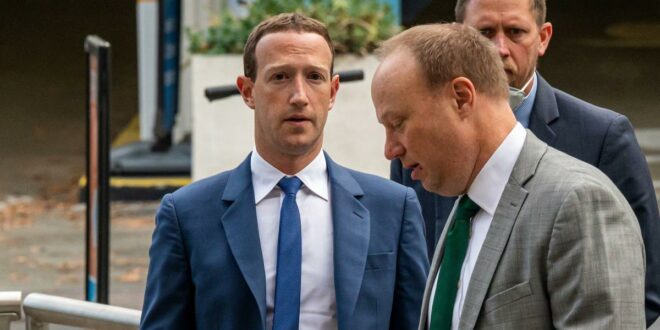Meta Platforms Inc.’s CEO says: , Mark Zuckerberg, The fact that his company does not have a virtual reality application for fitness does not keep him up at night, but having it will enhance competition and improve such applications.
Most Read from Bloomberg
“Having experiences is less important than what is,” he said at an experiment in San Jose, California, that concluded Tuesday. “By joining us, I believe we can also help them be a leader in this category” and “motivate other companies that are doing other good things in this area.”
Zuckerberg took the witness stand to defend his company’s acquisition of a virtual reality startup within Unlimited Inc. against the Federal Trade Commission’s antitrust lawsuit. His testimony on Tuesday is part of Meta’s campaign to defeat a lawsuit that seeks to block the company from acquiring the maker of Supernatural — a popular VR fitness app. Zuckerberg’s testimony follows that of Meta’s chief technology officer Andrew Bosworth the day before.
The FTC claims that Meta’s plan to buy the competitor would give it an unfair advantage in the burgeoning VR market. This argument is an early test of FTC Chairman Lena Khan and her more aggressive stance on antitrust enforcement. Late Monday, Meta and Inside extended the takeover deadline to the end of January, to give US District Judge Edward Davila time to make his decision.
FTC attorney Abby Dennis, who called Zuckerberg as a witness, asked whether platforms and applications in the history of computing are generally “coherent.” It cited testimony Zuckerberg gave earlier in the case, in which, according to Dennis, he said Facebook intended to build most apps for its platform itself.
Zuckerberg agreed that many companies, including Google and Microsoft Corp, are building key apps for their platforms.
“Apps tend to anchor the platform together rather than the other way around,” he said. But he resisted Dennis’ suggestion that the Wan acquisition was an important exit for his company. He said that Facebook, and now Meta, have focused on communication and social interaction applications. “We don’t try to build every app ourselves,” he said.
The FTC sued Meta in July over the deal, alleging that the company was seeking a virtual reality monopoly in much the same way that Facebook bought Instagram and WhatsApp to expand its social networking dominance. During the Trump administration, the agency filed a lawsuit against the company that sought to undo those deals retroactively. This issue is pending.
The lawsuit marks among the first time the Federal Trade Commission has pre-emptively challenged a deal by the social media giant, which has bought more than 100 smaller companies over the past decade. Technology companies and investors are watching the lawsuit closely amid concerns that the case could make takeovers of startups more difficult.
In closing arguments Tuesday, FTC attorney Dennis said Meta has acquired nine virtual reality studios in the past three years, including three since announcing its acquisition of Inside.
Davila urged approval of the agency’s request for an injunction preventing Meta’s takeover because it is pursuing a longer administrative procedure that begins next month. It challenged Meta’s argument that if Davila joined the FTC, the company would have to walk away from the acquisition.
“The deal will only be done if Mita wants it to be,” Dennis said. She said the court should reject Meta’s argument that “the FTC should not be able to challenge an action because challenges take time.”
Meta’s attorney, Mark Hansen, told Davila that his decision would determine the outcome of the deal. “This is the trial in this case,” he said, adding that Mita cannot wait two years for a longer administrative proceeding to be concluded.
He said The Inside deal is a “competitive acquisition” that will improve the “fitness mission” and the ability and availability of virtual reality for consumers. Hansen added that the deal is significant for startups aiming to acquire it. “If these opportunities weren’t there, far fewer people would take the risk,” he said.
Originally posted 2022-12-21 13:54:30.
